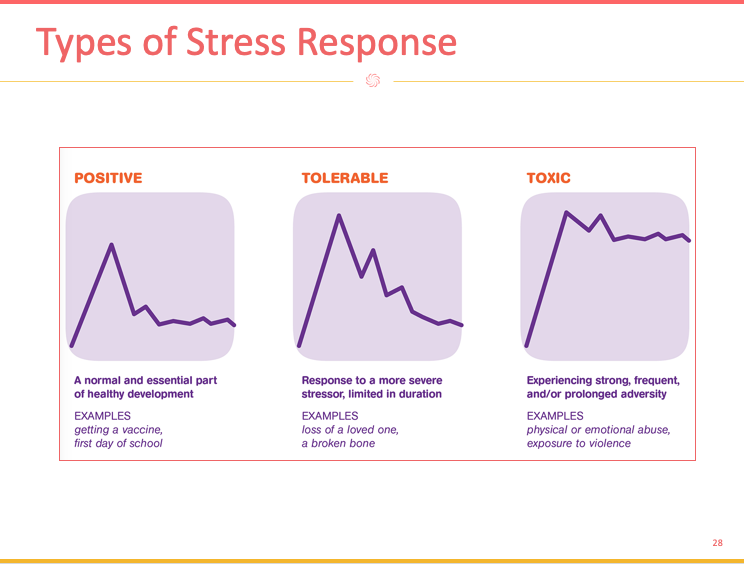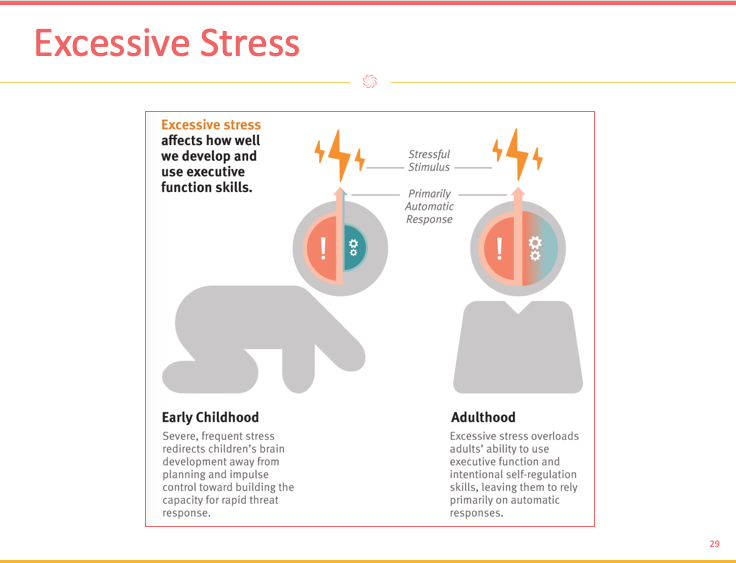During a genuine conversation reviewing an organization’s philosophy to talent management last week, one leader asked the difference between “having healthy tension” and “toxic tension” in the environment.
That’s a brilliant question I thought may benefit many of us…
As human beings, we do require and thrive on some healthy tension. Specifically, our performance can improve in snip bits when challenged with a specific end in mind. In that scenario, stress is our friend. It is an innate protective mechanism that intends to serve us – for our safety and wellbeing. When used at the right time with the right amount, stress can temporarily increase our awareness and improves physical performance (Van Duyne, 2003).
Having said that, there is a difference between transient and prolonged stress. You can think of transient stress as one experienced for a defined and a short period of time and prolonged stress as expanded in time.
Imagine there is a spectrum to the amount of stress. In that spectrum, humans can experience positive, tolerable or toxic stress and the impacts are vastly different (see below).

Positive stress is considered ‘normal’ and an essential part of human development. It is often experienced in brief increases in heart rate, mild elevations in hormone levels causing things like sweating. This is where we mostly want to be when offering someone a challenge. Tolerable stress actually activates the body’s alert systems. It is a warning saying, “watch out”. Toxic stress, on the other hand, is about experiencing strong and frequent elevations in response system as a way of handling long-lasting alerting.
This kind of prolonged activation of the stress response can actually disrupt brain architecture and create damage to other organ systems –, especially digestive ones. There is a common misperception that brain development only occurs during childhood years – this is incorrect. Though neural connection formation is more active during the early years, we do continue to develop new pathways into adulthood and excessive stress actually impairs a lot of our executive function abilities necessary to be successful in achieving our tasks.

Toxic stress is often described as the following behaviors in the workplace:
- Fear of being penalized for doing something ‘wrong’,
- Fear of being laid off,
- Overtime or overwork due to resource reductions,
- The pressure to perform more,
- Lack of control over day to day,
- A difficult relationship with manager or colleagues,
- Consistent change.
So, leaders, when you think you are being supportive (and perhaps challenging someone), please consider:
- How are you responding to a mistake? Are you supporting the learning and offering a discovery path to the root cause or are you pointing fingers?
- How are you communicating and implementing structural changes? Are you ripping off the band-aid or removing scar tissue bit by bit while making other scars?
- How are you handling resource shifts? Are you re-prioritizing and saying ‘no’ to new requests or are you redistributing and forgetting about the replacement(s)?
- How are you motivating people to performance? Are you nurturing per one’s unique gifts, capabilities, capacity, and interest or are you holding everyone to one standard?
- How are you delegating and empowering?
- How are you connecting?
- How are you driving change?
You get the point…
In the workplace context, it is okay and encouraged to have some challenges for people. The key is to recognize having a challenge requires one to have enough resources to cope with the situation/ task/ responsibility presented.
Please be informed toxic stress is very closely related to one’s ability to lose focus, creativity, and learning and it is reversely related to resilience development.
In that, always consider the outcome you are looking to drive and the potential impact on another.
Let me also share with you some disheartening facts…
Today, it is reported one out of ten people suffer from major depression and almost one out of five persons has suffered from this disorder during his (or her) lifetime (one-year prevalence is 10% and lifetime prevalence 17%) (Kessler et al 1994). By 2020, depression will be the second leading cause of world disability (WHO, 2001) and by 2030; it is expected to be the largest contributor to disease burden (WHO, 2008).
The US reports losing over $500B per annum from stress. That number is up from ~300 in the last few years. A few eye-opening statistics below those stats (references from different sources):
– 83% of us report work climate as a top source of stress,
– 33% of us suffer from insomnia,
– 91% of work injuries happen due to human error (related to tiredness or loss of focus),
– 64% of employees report feeling their employers not providing sufficient resources to manage stress.
A poorly controlled response to stress can be damaging to health and well-being if activated too often or for too long. Our job as leaders – guides to others and organizations – nurturers of groups is to provide the right conditions for one to flourish.
If we take the time necessary to think hard and long about the why and the how of what we are trying to achieve and not let that focus go, I am confident we can support people through all kinds of experiences.





